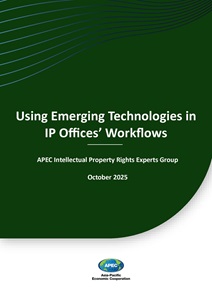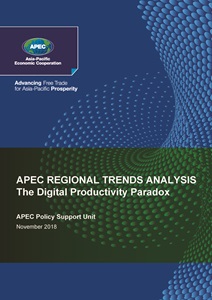
Reports
Using Emerging Technologies in IP Offices’ Workflows
The Asia-Pacific Economic Cooperation (APEC) is a regional economic forum established in 1989 to leverage the growing interdependence of the Asia-Pacific.
The Asia-Pacific Economic Cooperation (APEC) is a regional economic forum established in 1989 to leverage the growing interdependence of the Asia-Pacific.
APEC ensures that goods, services, investment and people move easily across borders. Members facilitate this trade through faster customs procedures at borders; more favorable business climates behind the border; and aligning regulations and standards across the region.
APEC ensures that goods, services, investment and people move easily across borders. Members facilitate this trade through faster customs procedures at borders; more favorable business climates behind the border; and aligning regulations and standards across the region.
APEC works to help all residents of the Asia-Pacific participate in the growing economy.
APEC works to help all residents of the Asia-Pacific participate in the growing economy.
Capacity building projects play an important role in helping translate APEC's goals into reality.
Capacity building projects play an important role in helping translate APEC's goals into reality.

Reports
•November 2018
Download Report
3MB
Published Under
APEC Secretariat, APEC Policy Support Unit
Accessed
22437
Pages
40
The November 2018 issue of APEC Regional Trends Analysis begins with a theme chapter on the Digital Productivity Paradox. Digital technology has improved by leaps and bounds, making productive tasks easier and more efficient. However, despite these advances, economists have observed a downward trend in labour productivity growth in the past two decades. The theme chapter explores why improvements in digital technology are not translating to labour productivity growth, finding that industrial-era institutions and policies may need to be adjusted for a digital economy. It points to the importance of structural reforms, infrastructure development, and reskilling to adapt to the digital age.
The next chapter on economic and trade trends shows that the first half of 2018 was marked by continuing economic growth amid a backdrop of heightened uncertainty due to escalating trade tensions and a new normal of higher global interest rates. The region is expected to maintain robust growth in 2018, but growth is projected to moderate in 2019‒2020. The balance of risks has tilted to the downside due to prolonged and heightened policy uncertainty and trade tensions as well as higher inflation, exchange rate pressures, and episodes of financial market volatility. On the upside, growth potential could come from a continued pick-up in global economic activity translating to sustained strength in domestic consumption.

